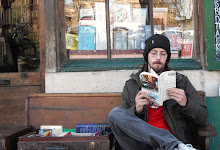
I haven’t finished any books since the last one and it’s becoming a matter of extreme urgency that I do. Everything is becoming, in some way or another, an analogy for the Israel-Palestine conflict. This monomaniacal tendency must stop!
Right now, I’m reading two books.
The first is A. C. Grayling’s the Meaning of Things which I highly recommend to anybody eager to attach some philosophical significance to their lives.
The book spawned from his column in the Guardian, the Last Word, in which he turned his attention a different topic each week. He deals with all aspects of life from love to hate, prudence to intemperance, and explains the ins and outs of each in a very common-sense, matter-of-fact way.
Among it’s virtues, the biggest selling point, for me, is the brevity in which he tackles these subjects, rarely stepping over the three-page mark, making the Meaning of Things an excellent bathroom book.
Furthermore, you can read the entries in whichever order you prefer and, if you’re that way inclined, you can use it as a reference book for life or, if you have none of your own, a portable, moral compass.
Grayling’s CV is impressive, to say the least. With a shelf-load of other books to his name and an extensive list of academic achievements under his belt, there’s little reason at all to doubt a single word he says.
I’d go further than that, actually - I may just abandon all free will and leave my every future decision in his hands.
Therein lies the problem with philosophy - something I’ve been meaning to rant about for a while.
For every problem you encounter, if you’re a regular person as opposed to a world leader, you can find, in philosophy, as many arguments for a decision as you can for it’s contrary.
If you take this too seriously, you end up considering the ‘philosophical connotations’ of every little thing to the point where the only remaining action is no action at all.
In extremes, philosophy amounts to little more than a cause of inner turmoil and an excuse for sheer bone-idleness. For this reason, 99% of the world’s philosophers remain unknowns, conscientiously avoiding employment whilst sleeping under bridges.
Rant over.
Book two on the bedside table is Bad Blood by Colm Tóibín, in which a lone Wexford novelist goes for a walk along the Irish border in the wake of the Anglo-Irish agreement in 1994.
In many ways, the book concerns a past which, touch wood, has been banished to the annals of history, when Ulster still said ‘No’ and you could still smoke in the few pubs that hadn’t been blown up or purloined by the British Army.
But I’ll come back to that once I’ve finished it.
That just about wraps this entry up but before I go, I’d like to make a formal, public apology to Robert Green for selling him those new, experimental gloves. In my defence, Robert, you were forewarned that the technology hadn’t been properly tested and any unfortunate consequences are largely due to your own impatience.
So, no. You can’t have your money back.






No comments:
Post a Comment